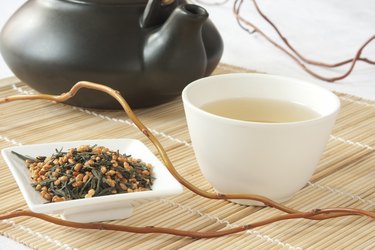
Brown rice is the chameleon of foods: It's used in pasta, flour, vinegar, cookies, cakes — and even tea. Here's what you need to know about this drink, popular in many Asian cuisines, and whether it has any health benefits.
The varietal is actually a Japanese invention, according to a July 2010 Bangkok, Thailand-based Kasetsart University study in Natural Science. Called "genmaicha," it's green tea mixed together with roasted brown rice.
Video of the Day
Video of the Day
The original idea behind the creation of brown rice tea, per the above research, was to add inexpensive rice to the product to lower the price as a way to devise a tea that was accessible to the poor.
Today, the study authors note, that's no longer an issue. Brown rice tea — which can range widely in taste from slightly pungent to fresh to bitter, depending on the blend — has become a staple across Japan and Korea.
Green Tea Health Benefits
Green tea, a component in brown rice tea, is made from the leaves of the Camellia sinensis plant, which are then steamed, pan-fried and dried, according to the National Center for Complementary and Integrative Health (NCCIH).
Per the NCCIH, green tea is touted for health benefits including:
- Bolstering mental alertness
- Relieving headaches
- Improving digestive symptoms
- Promoting weight loss
Read more: How Much Green Tea Should You Drink Per Day?
Brown Rice Health Benefits
In the brown variety of rice, the whole grain is left intact, rather than stripped and polished away, as it is in white rice, per the Harvard T.H. Chan School of Public Health. Thus, compared to its refined cousin, brown rice retains a lot more of its natural and nutritious content, including:
- Vitamins B1 and B6
- Fiber
- Magnesium
- Phosphorous
- Selenium
- Manganese
Health Benefits of Brown Rice Tea
1. It's Low in Caffeine
The two elements put together to make brown rice tea result in "a good option for those who want to limit their caffeine intake," St. Louis, Missouri-based Connie Diekman, MEd, RD, registered dietitian and former president of the Academy of Nutrition and Dietetics, tells LIVESTRONG.com. "Brown rice tea can vary in caffeine based on the length of time the tea is steeped."
Notably, when testing it for taste, the team behind the Natural Science study steeped 2 grams of tea in 200 milliliters of boiling water in a white ceramic cup for three to five minutes.
The specific leaves used in a particular brown rice tea mix can also affect caffeine levels, Diekman says. "But, in general, it has about 0.5 milligrams of caffeine per ounce, or 4 milligrams in 8 ounces. As a comparison, espresso has 77 milligrams of caffeine in a 1.5-ounce shot," she says.
2. It's Rich in Antioxidants
"Brown rice tea carries many of the positives of green and black tea, with the phytonutrients being a key part," Diekman says.
That means that brown rice tea is a good source of flavonoids and other antioxidants, while also containing some trace minerals, "manganese and selenium being two of note," Diekman says, "along with some B vitamins, fiber and iron."
That said, "none of the nutrients are present in high amounts," Diekman says.
3. It's Linked to Perks for Other Health Conditions
Whether or not there are any real health effects from drinking brown rice tea has not been fully fleshed out.
On the one hand, a November 2013 Mayo Clinic Health Letter indicates that green tea is associated with a lower risk of several types of cancer (including bladder, esophageal, ovarian and pancreatic cancers).
But research on the effects of brown rice tea specifically is extremely thin. In the only study to date on the anti-cancer potential of green tea — and brown rice tea (bancha/genmaicha) specifically — its effects on one type of cancer was explored. A large January 2016 Japanese study in Cancer Science found that prior research efforts broadly exploring green tea's anti-cancer properties have been inconclusive. And after testing brown rice tea's specific potential as a way to fend off biliary cancer among 140,000 people, the team did not observe any significant effect.
Ultimately, whether or not brown rice tea is really your cup of tea may just come down to taste.
Read more: The Ultimate Guide to the Health Benefits of Tea
- Connie Diekman, MEd, RD, LD, FADA, food and nutrition consultant; former president, Academy of Nutrition and Dietetics; coauthor, The Everything Mediterranean Diet Book; former director, university nutrition, Washington University, St. Louis, Missouri
- Natural Science: “Preference Mapping of Thai Consumers for Commercial Green Tea With Roasted Brown Rice”
- National Center for Complementary and Integrative Health: “Green Tea”
- Harvard T.H. Chan School of Public Health: “The Nutrition Source: Rice”
- Mayo Clinic Health Letter: “Reliable Information for a Healthier Life: Antioxidants”
- Cancer Science: “Association Between Green Tea/Coffee Consumption and Biliary Tract Cancer: A Population-Based Cohort Study in Japan”